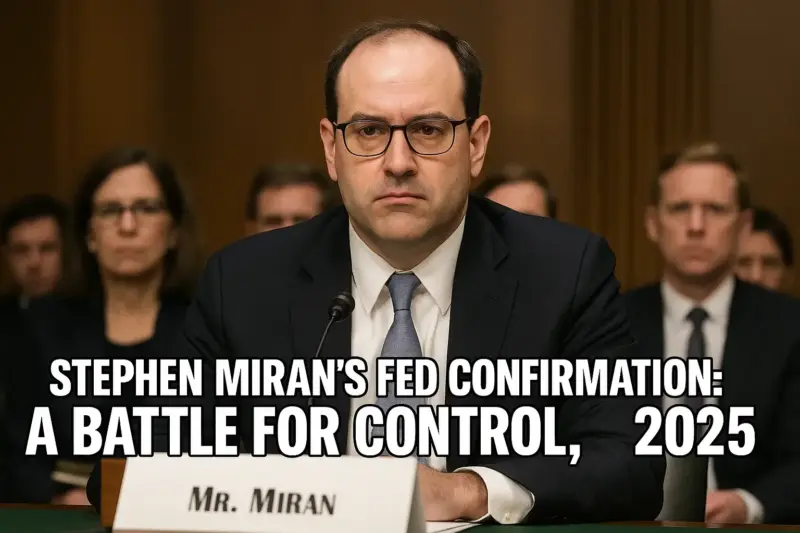A High-Stakes Senate Showdown
Stephen Miran, President Donald Trump’s nominee for a vacant Federal Reserve governor seat, faced a fiery Senate confirmation hearing that underscored deep divisions over the Federal Reserve’s independence. Miran, a top White House economic adviser, vowed to uphold the central bank’s autonomy, but his past proposals to give presidents more control sparked skepticism, particularly among Democrats. As Trump pushes to reshape the Fed amid a controversial attempt to fire Governor Lisa Cook, the Miran confirmation raises critical questions about the balance of power in America’s monetary system.
The Human Impact: Trust in the Fed at Stake
The Miran confirmation has polarized public sentiment, with Federal Reserve independence becoming a rallying cry for economists and citizens alike. On X, users like @EconWatcher warned, “If Miran’s a Trump loyalist, markets could lose faith in the Fed’s neutrality.” Meanwhile, Trump supporters argue the Fed needs reform, with one post stating, “Miran will bring accountability to a bloated system.” The controversy affects millions of Americans, as Fed decisions influence interest rates, impacting mortgages, savings, and jobs. For Lisa Cook, a Black woman and Biden appointee, Trump’s attempt to oust her over unproven mortgage fraud allegations has raised concerns about political targeting, further eroding trust.
Facts and Figures: The Hearing Unpacked
The Senate Banking Committee hearing focused on Miran’s nomination to fill the remaining term of Adriana Kugler, who resigned in August 2025, expiring January 31, 2026. Miran, chair of Trump’s Council of Economic Advisers, proposed reforms in 2024 with Dan Katz, including shorter Fed governor terms and presidential power to fire them at will, per POLITICO. During the hearing, he pledged to act “independently based on economic data,” but his plan to take an unpaid leave from the White House drew fire from Democrats like Sen. Jack Reed, who called it “ridiculous” for maintaining ties to Trump.
Democrats, led by Sen. Elizabeth Warren, accused Miran of being Trump’s “puppet,” citing his refusal to refute Trump’s claim that 2024 jobs data was rigged. Republicans, including Sen. John Kennedy, supported Miran, emphasizing the need for a “monetary plan not built on vodka and darts.” The Federal Reserve Act mandates independence, with governors serving 14-year terms and removable only for cause. Trump’s attempt to fire Cook, now under legal challenge, and a Justice Department probe into her, reported by The Wall Street Journal, add complexity. The Fed’s next meeting on September 16–17, 2025, may see a quarter-point rate cut, with Miran’s confirmation rushed to influence it.
The Broader Context: A Power Struggle
The Miran confirmation is part of Trump’s broader campaign to control the Fed, which manages $8.3 trillion in assets, per 2025 Fed data. His push for lower interest rates, claiming high rates burden federal debt, has clashed with Fed Chair Jerome Powell’s stance on inflation risks from Trump’s tariffs. The Lisa Cook lawsuit, filed after Trump’s August 2025 firing attempt, tests the Federal Reserve Act’s “for cause” removal clause, with a federal judge set to rule soon. Public sentiment is divided: a 2025 Gallup poll shows 54% of Americans support Fed independence, down from 62% in 2020, reflecting growing politicization.
What Lies Ahead: A Fragile Balance
Miran’s confirmation seems likely, with Republican senators like Tim Scott backing him, but Cook’s fate remains uncertain. If confirmed, Miran could influence rate decisions and discussions about Powell’s successor, whose term as chair ends in May 2026. A prolonged legal battle over Cook could set a precedent for presidential power over the Fed, potentially destabilizing markets. Economists warn that eroding independence could spike inflation expectations, with JPMorgan Chase predicting a steeper yield curve if Miran pushes Trump’s agenda. Transparency and legal clarity are critical to maintaining global confidence in the U.S. economy.
Safeguarding Independence
To preserve Federal Reserve independence, Congress must reinforce the Federal Reserve Act’s protections, ensuring governors serve without political pressure. Public education on the Fed’s role could counter misinformation fueling the debate.
Conclusion: A Defining Moment for the Fed
The Stephen Miran confirmation is a flashpoint in Trump’s quest to reshape the Federal Reserve, testing the delicate balance between presidential influence and central bank autonomy. As the Senate weighs Miran’s role and Cook’s future hangs in the balance, the outcome will shape America’s economic stability. Protecting Federal Reserve independence is vital to safeguard trust, markets, and the livelihoods of millions.






